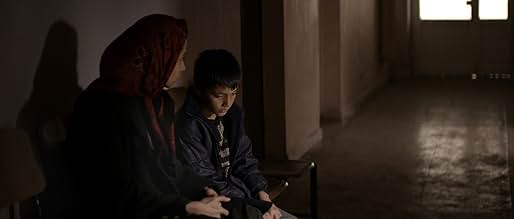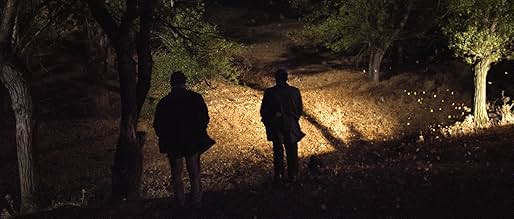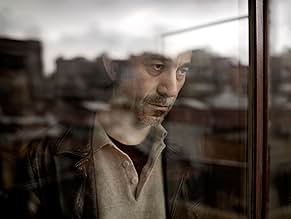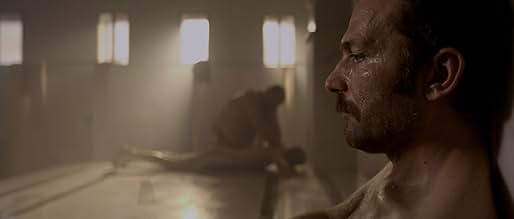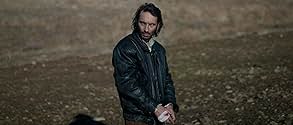- Awards
- 21 wins & 34 nominations total
- Director
- Writers
- All cast & crew
- Production, box office & more at IMDbPro
Featured reviews
A dark cold night over the Turkish steppes, an entourage of police detectives, a commissioner, a doctor, and two grim prisoners in tow search for a dead body for over 2 hours in the darkest part of the night. What appears to be a good setup for the latest police procedural, crime fiction, thriller, even midnight horror turns out unexpected intensely revealing character portraits, in a most exhaustive and surprisingly humorous way. Recreating his earlier slow burn meditations, yet with a new sense of maturity "Anatolia" is true to the real rhythms of night, the frustrations of waiting for the crucial evidence to appear, the vagueness of memory, remembrance of traumatic events in love and in murder and the bleakness of night of the eternal night and unwelcome truths revealed by the day.
One senses the tedium and frustration of the murder investigation, simultaneously the dread and anticipation of revealing the dead body in it's gory realism, the salacious details resulting in the murder itself and the public crucification of the culprits Anatolia however is almost an antithesis to the psychological revelations over the course of the night.
Before (and if) we reach the major discovery, the police officers and commissar reveal their aversions to murder, mortality, the search for a guilty suspect before the evidence is revealed, their cultural differences, assumptions about class differences, marriage, and human nature. Throughout the eternal stillness of night, poetic treatises about life, death and love are superimposed over cracks of thunder, howling winds and pattering rains, the harsh spotlight of car headlamps contrast with the comforting glow of a flickering lantern on a village porch.
The search is tedious and frustrating for both the officers and the audience, as much as the motives are unclear, like love, life, and marriage. The ambiguity of night is as unclear as the motives for murder, does daybreak reveal anything revelatory, and does the dissection of a murder case hours and days after its uncovering reveal any truth into it's motives or human nature itself?
The audience should be wiser against the small town working-class police task-force just following orders; they may empathise more with the reflective and sensitive Doctor Cemal or the cunning and charismatic Prosecutor Nusret, yet under the surface, their own personal lives in marriage and children are vexed, the investigation is almost a respite from these frustrations. The commissioner seems haunted by his ill wife, yet on the surface, this is treated as a running joke, later, it reveals thematic links to the search for answers in the unknown murder case. Similarly the doctor tries to make peace with his conscience about a past personal relationship. The impression of him is the most sensible, grounding the moral compass, yet his flaws are also revealed by daylight.
Contrasts between these characters and the murder suspect who appears (at least on the surface) to be more emotionally stable than many of the prosecutors is complex and kaleidoscopic. This is a remarkable introspective film ostensibly exploring a murder case and therefore guilt and conscience, yet further introspection reveals riffs on love story(ies), female roles, family, honour, class prejudice and the legal system.
Women appear seldom in the film, some wives are talked about yet, their effect on the men (and audience) is haunting, magnetic, and enigmatic. The small towns which they stop at along their road trip are barren, simple, country-like, impressing the sense of isolation both physically and more saliently, emotionally. The appearance of women and children in these towns is revelatory and thirst-quenching. Therefore a lot of time spent for introspection and meditation, watching how the characters reacting to the tedium, stress, fatigue and mortality of a long hard night.
The terrain of Anatolia is a foreboding character in itself with it's rolling fields illuminated by the sharp piercing car headlights slicing the night like snippets revealed about each character - yet the whole picture remains hidden. A storm is sensed coming both literally and figuratively, the expectant howling winds like ghosts of the dead and the memories of the characters across the unforeseeable terrain. The mood is incredibly poetic, rhythmically blending with the sounds of the whistling winds, the crunch of icy gravel, pattering of rain, and fluttering pigeons, all in the emptiness of night.
Nuri Bilge Ceylan's previous films have been sombre (frustrations) meditations on human nature, such as the brewing storm in 3 Monkeys, the solitude of cascading snow and the cracking waves of the harbour in Distant, to the scorching blistering summer in Climates; environment and mood work in integration in his work. In "Anatolia", the moods over the windy plains are as intense as the brewing moods in the characters.
The scenes of the cars rolling across the plains lit only by the headlights occupy the initial part of the film. They run almost in real time; with the wind whipping though grass and plains they form a stark, haunting and grim atmosphere. There are bravura haunting scenes like the rolling apple down the hill, whilst initially seemingly superfluous, yet curious it's implications to reveal characters' current moods and eventual outcomes. And the the colloquial dinner at the mayor house under the swaying candlelight, then in pitch darkness, the light revealing (literally) different shades of each character; they the revelation (apparition) of a miraculous figure moments later is spellbinding.
This is cinema with the highest respect for the audience, yet Ceylan has said that he wants to bore the audience, "because out of boredom might come a miracle - maybe days later, maybe years." Not sure whether to take this seriously however what it does demonstrate is a greater onus on viewer to think actively about the story and the consequences; out of deep reflection perhaps may come a revelation about the characters and ourselves.
One senses the tedium and frustration of the murder investigation, simultaneously the dread and anticipation of revealing the dead body in it's gory realism, the salacious details resulting in the murder itself and the public crucification of the culprits Anatolia however is almost an antithesis to the psychological revelations over the course of the night.
Before (and if) we reach the major discovery, the police officers and commissar reveal their aversions to murder, mortality, the search for a guilty suspect before the evidence is revealed, their cultural differences, assumptions about class differences, marriage, and human nature. Throughout the eternal stillness of night, poetic treatises about life, death and love are superimposed over cracks of thunder, howling winds and pattering rains, the harsh spotlight of car headlamps contrast with the comforting glow of a flickering lantern on a village porch.
The search is tedious and frustrating for both the officers and the audience, as much as the motives are unclear, like love, life, and marriage. The ambiguity of night is as unclear as the motives for murder, does daybreak reveal anything revelatory, and does the dissection of a murder case hours and days after its uncovering reveal any truth into it's motives or human nature itself?
The audience should be wiser against the small town working-class police task-force just following orders; they may empathise more with the reflective and sensitive Doctor Cemal or the cunning and charismatic Prosecutor Nusret, yet under the surface, their own personal lives in marriage and children are vexed, the investigation is almost a respite from these frustrations. The commissioner seems haunted by his ill wife, yet on the surface, this is treated as a running joke, later, it reveals thematic links to the search for answers in the unknown murder case. Similarly the doctor tries to make peace with his conscience about a past personal relationship. The impression of him is the most sensible, grounding the moral compass, yet his flaws are also revealed by daylight.
Contrasts between these characters and the murder suspect who appears (at least on the surface) to be more emotionally stable than many of the prosecutors is complex and kaleidoscopic. This is a remarkable introspective film ostensibly exploring a murder case and therefore guilt and conscience, yet further introspection reveals riffs on love story(ies), female roles, family, honour, class prejudice and the legal system.
Women appear seldom in the film, some wives are talked about yet, their effect on the men (and audience) is haunting, magnetic, and enigmatic. The small towns which they stop at along their road trip are barren, simple, country-like, impressing the sense of isolation both physically and more saliently, emotionally. The appearance of women and children in these towns is revelatory and thirst-quenching. Therefore a lot of time spent for introspection and meditation, watching how the characters reacting to the tedium, stress, fatigue and mortality of a long hard night.
The terrain of Anatolia is a foreboding character in itself with it's rolling fields illuminated by the sharp piercing car headlights slicing the night like snippets revealed about each character - yet the whole picture remains hidden. A storm is sensed coming both literally and figuratively, the expectant howling winds like ghosts of the dead and the memories of the characters across the unforeseeable terrain. The mood is incredibly poetic, rhythmically blending with the sounds of the whistling winds, the crunch of icy gravel, pattering of rain, and fluttering pigeons, all in the emptiness of night.
Nuri Bilge Ceylan's previous films have been sombre (frustrations) meditations on human nature, such as the brewing storm in 3 Monkeys, the solitude of cascading snow and the cracking waves of the harbour in Distant, to the scorching blistering summer in Climates; environment and mood work in integration in his work. In "Anatolia", the moods over the windy plains are as intense as the brewing moods in the characters.
The scenes of the cars rolling across the plains lit only by the headlights occupy the initial part of the film. They run almost in real time; with the wind whipping though grass and plains they form a stark, haunting and grim atmosphere. There are bravura haunting scenes like the rolling apple down the hill, whilst initially seemingly superfluous, yet curious it's implications to reveal characters' current moods and eventual outcomes. And the the colloquial dinner at the mayor house under the swaying candlelight, then in pitch darkness, the light revealing (literally) different shades of each character; they the revelation (apparition) of a miraculous figure moments later is spellbinding.
This is cinema with the highest respect for the audience, yet Ceylan has said that he wants to bore the audience, "because out of boredom might come a miracle - maybe days later, maybe years." Not sure whether to take this seriously however what it does demonstrate is a greater onus on viewer to think actively about the story and the consequences; out of deep reflection perhaps may come a revelation about the characters and ourselves.
Nuir Bilge Ceylon's "Once Upon a Time in Anatolia" is the complete antithesis to the conventional American crime drama, which routinely features detectives with matinée-idol looks, an assortment of plot twists and red herrings, and a series of breath-bating car chases to keep the masses from bolting for the exits.
"Once Upon a Time in Anatolia" has none of these. In fact, it features a cast of balding, sagging, middle-aged men - a police chief, a prosecutor, a doctor and two murder suspects - who have gone on a night- long search, through the dour planes of Turkey, in search of a buried body. As the night drags on, the men engage in a series of long, angst- ridden conversations that reveal how their constant exposure to and intimate involvement with the sordid and depraved aspects of the human condition have made them pessimistic and cynical about life. Yet, in the end, at least one of the characters finds a way, through a bit of professional compromise, to bring a little less darkness into the world.
Meanwhile, at every step in the drama, the movie drains the process of crime detection of all its "glamour."
It's a long - 157-minutes long, in fact - methodical, and frequently ponderous journey into the heart of darkness, but fine performances and a complete lack of conventionality make it a trip worth taking.
"Once Upon a Time in Anatolia" has none of these. In fact, it features a cast of balding, sagging, middle-aged men - a police chief, a prosecutor, a doctor and two murder suspects - who have gone on a night- long search, through the dour planes of Turkey, in search of a buried body. As the night drags on, the men engage in a series of long, angst- ridden conversations that reveal how their constant exposure to and intimate involvement with the sordid and depraved aspects of the human condition have made them pessimistic and cynical about life. Yet, in the end, at least one of the characters finds a way, through a bit of professional compromise, to bring a little less darkness into the world.
Meanwhile, at every step in the drama, the movie drains the process of crime detection of all its "glamour."
It's a long - 157-minutes long, in fact - methodical, and frequently ponderous journey into the heart of darkness, but fine performances and a complete lack of conventionality make it a trip worth taking.
Ceylan's films always get criticized for being too slow, and yes, they are slower, sometimes much slower, than what the flickering-advertisement generation is used to today. In Turkey, he is heavily criticized for being "too artsy," inaccessible, and boring. I, on the other hand, marvel at how non-Turkish audiences can actually watch and like his films; it speaks volumes for his brilliant talent in making something so foreign and different a universal piece for everyone to appreciate. The untranslatable colloquial language, the lives of people in remote parts of Turkey with petty worries, a murder investigation that happen in snail pace, the local politics of small, mud-brick villages all become accessible. Combined with his impeccable sense of cinematography and some stellar performances, especially from Yilmaz Erdogan, whom we are more used to seeing in comedic roles, the film shines.
Why a 7/10, then? Well, I have seen all of Ceylan's films. They all execute the story arc well. They do not have Hollywood endings where everything is neatly resolved, of course, but they usually have some progress and movement through the arc. Somehow, this film lacked that. I felt like the main story arc was not fulfilled. I cannot really explain it; perhaps it was that too many things were left untold, or some "hints" were too vague and just when you thought they will lead somewhere, they didn't? Nevertheless, Once Upon a Time in Anatolia is another cinematic gem from the Turkish master. Highly recommended for those who do not have to have action packed scenes and formula-bound stories to enjoy a film.
Why a 7/10, then? Well, I have seen all of Ceylan's films. They all execute the story arc well. They do not have Hollywood endings where everything is neatly resolved, of course, but they usually have some progress and movement through the arc. Somehow, this film lacked that. I felt like the main story arc was not fulfilled. I cannot really explain it; perhaps it was that too many things were left untold, or some "hints" were too vague and just when you thought they will lead somewhere, they didn't? Nevertheless, Once Upon a Time in Anatolia is another cinematic gem from the Turkish master. Highly recommended for those who do not have to have action packed scenes and formula-bound stories to enjoy a film.
This film won the Grand Prix in Cannes, and it was deserved. A team goes into the countryside to find the body of a murder victim. The team includes the two men accused of the murder,one of whom has confessed and says he wills show them where they buried the body, the police chief, prosecutor, doctor, diggers, and guards. As the night drags on into the next day and the body is not found, the men grow more and more tired. Much of the film is beautifully shot in the dark or semi-dark, lit only by the headlights of the cars or a lamp in the village where they stop to rest. The filming is slow, showing the beautiful countryside and vignettes that wonderfully shed light on the different characters. What seems to be a simple task grows more and more complex; everything in the movie turns out to be more complicated than it first seems. Everyone seems to be guilty of something, so the film becomes a question not only of will the body be found, but who is guilty of what?
One could say that the film is too slow, but just as the team grows more and more tired, so arewe as the viewers, participating in the fatigue of the team, drawn into the feelings of the characters. Women and children are present only as lovely cameos in the film, but are behind almost everything. The actors are all superb, and it was amazing to me that Ceylan could show such depth and breadth of character and emotion and drama with only a few lines of dialog and amazing closeups of the faces.
One could say that the film is too slow, but just as the team grows more and more tired, so arewe as the viewers, participating in the fatigue of the team, drawn into the feelings of the characters. Women and children are present only as lovely cameos in the film, but are behind almost everything. The actors are all superb, and it was amazing to me that Ceylan could show such depth and breadth of character and emotion and drama with only a few lines of dialog and amazing closeups of the faces.
I think this is the best movie of 2011 so far. A very different, but brilliantly conceived three part police procedural that is really a character study of two men and how they each deal with the past. In many ways, I had a similar experience here to what I have when I read a really good novel. The characters are rich and complex, often funny, and thoroughly believable. Nothing is crammed down the audience's throat, yet there is so much detail and nuance that it becomes easy to see the two men for the basically good, complex people they are. This is a movie that respects the audience's intelligence. It is also a movie that is easily among the best shot and edited of the year. In fact, it is hard to think of a single thing that I would suggest to improve the film. I have seen other Ceylan films, but nothing of his has ever had the depth, nuance and humanity of this one.
Did you know
- TriviaThe anecdote about the sudden death of a woman told by prosecutor Nusret and the doctor's deduction come from the short story The Examining Magistrate by Russian writer Anton Chekhov.
- GoofsNaci speaks to his wife on the mobile phone. When his wife hangs up angrily, a dial tone is heard. No dial tone is heard on mobile phones.
- Quotes
Prosecutor Nusret: Ignore Naci. He's just a handful of bees, as my mother would say. All noise and no action.
- ConnectionsFeatured in The 2013 Film Independent Spirit Awards (2013)
- How long is Once Upon a Time in Anatolia?Powered by Alexa
Details
- Release date
- Countries of origin
- Official sites
- Language
- Also known as
- Once Upon a Time in Anatolia
- Filming locations
- Production companies
- See more company credits at IMDbPro
Box office
- Gross US & Canada
- $152,408
- Opening weekend US & Canada
- $10,952
- Jan 8, 2012
- Gross worldwide
- $2,099,472
- Runtime2 hours 37 minutes
- Color
- Sound mix
- Aspect ratio
- 2.39 : 1
Contribute to this page
Suggest an edit or add missing content

Top Gap
By what name was Il était une fois en Anatolie (2011) officially released in India in Hindi?
Answer

